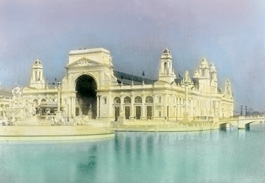home | metro silicon valley index | the arts | books | review

Light Makes Might: Thomas Pynchon's new novel begins in the Chicago World's Fair of 1893, where the Electricity Building exhibited the marvelous new technology.
Electric Airs
Thomas Pynchon moves from gravity to electricity in his mammoth new novel, 'Against the Day'
By John Freeman
THOMAS PYNCHON has always distrusted the sky. A technical writer for Boeing in the early 1960s, he smuggled his knowledge of missile systems into V (1963) and The Crying of Lot 49 (1966) and lambasted the depravity of air warfare in his great novel, Gravity's Rainbow (1974). Now, as he enters his 70s, America's most insistently playful but deadly serious novelist unveils Against the Day, a tale, and a very big one at that, in which, for once, the air might be our very salvation. Unless, of course, it is bought and controlled by industrialists—or aliens.
Welcome back to Pynchonland, where wormholes in time are as common as potholes, and the real world overlaps with the imaginary in a most colorful weave. Against the Day opens in Chicago in 1893 at the World's Columbian Exposition, where a group of balloonists named the Chums of Chance alights to discover a city bathed in electricity—it's the dawn of the Second Industrial Revolution, and already light is being put to ill use. Their job is to spy on anarchists on the streets down below.
Thus begins this novel's tug of war between industry and entropy, a perpetual theme in Pynchon's work but an especially vividly drawn one here. In one subplot, an anarchist named Webb Traverse is murdered for his activities on behalf of miners, bequeathing to his children—Lake, a prostitute; Kit, a Yale physics student; Frank, an engineer; and Reef, an anarchist—a complicated legacy of regret and vengeance.
There are scores of other characters, many hilariously named. A sinister gangster named Scarsdale Vibe wants to control the Earth's electromagnetic field—"colonize the sky," as one character puts it. Vibe might just be behind hit men Sloat Fresno and Deuce Kindred, and his reach seems to stretch all the way to Germany, where Kit goes to study vector theory in mathematics and falls for the comely Yashmeen Halfcourt.
Keeping all of these characters straight sometimes feels next to impossible. Would it have been too much to give us a dramatis personae? Or even a glossary? Indeed, Against the Day doesn't feel written to human scale. The sentences run to typical Pynchonian length, and the typeface is alarmingly small.
It's like dropping a penny into an open manhole—the novel simply swallows the time and asks for more. And yet, Pynchon does reward the effort. Who else would think to stuff a book this serious with such touches as a talking lightning bolt and a dog who reads in French? And the man can write. Trains go "choiring by," while land below the balloonists is "perforated with lakes." Watching a Yale track meet, Kit sees his classmates "striving toward the day's offers of simulated immortality."
Like Bruegel's painting Landscape With the Fall of Icarus, this is a portrait of mankind's attempt to transcend our mortality—or at least push up against its very edge. The Chums of Chance believe that Iceland spar—or calcite crystals—shows them the key to other dimensions, and Kit's mathematics has a distinctly mystical bent. "It could have been a religion," he thinks at one point. "Here was the god of Current, bearing light, promising death."
Ruthless, greedy Vibe is that god's angel of death. He squashes labor, crushes individuals and rides on a personal train called "The Juggernaut." He controls invention by making minds beholden to him. He buys up the ideas of Nikolai Tesla, who makes a cameo appearance, to ensure they aren't put into production. "Don't thank me," he barks at Kit, whose education he springs for. "Become the next Edison."
Electricity, as Pynchon has noted before, has a kind of Nietzschean "will to power"—it wants to be discharged, but it must be guided by a humanity. In the wrong hands, it becomes dangerous or simply a vehicle for making more money. Remarkably, and with a whiff of optimism that is new for Pynchon, Against the Day proceeds as if the verdict is still out on which way our ability to light up the skies and obscure the heavens might go.
Against the Day, by Thomas Pynchon; Penguin Press; 1,085 pages; $35 cloth
Send a letter to the editor about this story.
|
|
|
|
|
|